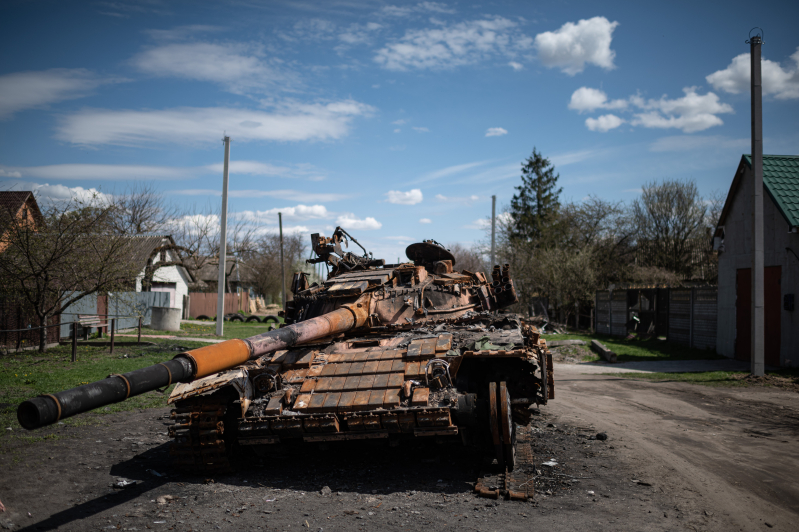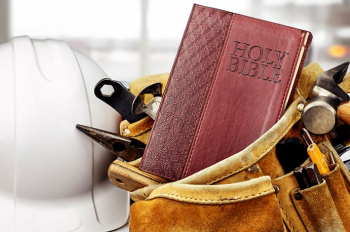
Jeff Fountain, a journalist by trade, is the founder and director of the The Schuman Centre for European Studies. Originally from New Zealand and now living in Holland, he led Youth With A Mission (YWAM) in Europe for 20 years. He also helped create Hope for Europe, an umbrella initiative for evangelical groups on the continent.
In a three-part series by Christian Daily International, Fountain shares his perspectives for evangelicals on the spiritual landscape driving Europe, both past, present and future.
In this third of three articles, the former YWAM leader urges Christians to pray for Ukraine and what will come after the Russia-Ukraine war will end.
The “unprovoked and unjustified” invasion of Ukraine by Russia in February 2022 showed “some of the worst traits of humankind”, according to Gavin Calver, CEO of the UK Evangelical Alliance.
Writing in March of that year, Calver called on Christians to pray for all concerned, voice opposition, give sanctuary to refugees, and “respond with hearts, hands and wallets.” Similar voices were raised by evangelicals across Europe and beyond.
Two years later, thousands of Ukrainians and Russians have died in what has become an intractable war – so how should Christians react now, when there is still no end to the conflict in sight? Jeff Fountain, director of The Schuman Centre for European Studies, emphasizes the importance of prayer and practical help as before, but also highlights that it is critical to prepare for the future aftermath.
“It’s essential that we realize that this is not just business as usual,” said Fountain. “We have reached a new phase. The order that was established with Christian roots after the Second World War is under strong attack from Putin right now.
“That's not to say the West has always kept its hands clean and that it's only good and bad. But we do need to recognize that this order that has led to 70 years of relative peace, really we are coming to a new chapter. And if we don't succeed at this phase, the future of Europe will be very different. So that's a point for prayer.”
Fountain also stressed the importance of seeing the “big picture” with the Ukraine conflict. This means understanding the role of the gospel within the shaping of the European integration process. He acknowledged that not “everything that's happened in the European integration process has been wonderful.”
Yet there is arguably a real desire for Europe within Ukraine, compared to a more indifferent European country such as Holland where Fountain resides.
Looking at the last several decades, he sees a sequence of events including the world wars, and the fall of the Berlin Wall, marking a new chapter with Ukraine’s fight for autonomous freedom.
“I said before, hardly any Dutch person knows what Europe Day is [on May 9]. But if you go to Ukraine, most of the people will be able to tell you what Europe Day is.”
Fountain himself has seen 50,000 Ukrainians celebrating Europe Day previously on May 9.
“Now, there's not even a European flag to be seen in Holland. Nobody knows what Europe Day is here. We take it for granted. We've taken all the peace and the stability that's come as a result of what took place at Europe Day for granted.
“But the people who don't have it know what they're missing out on and want it. And that's why this war is going on right now. It is actually a struggle for Europe that's based on these Christian values we talked about before, and we need to be praying for Russia and the Russians at the same time, for God's purposes for them to be fulfilled.”
Fountain referenced the Christian values of love and forgiveness, which led to former French politician Robert Schuman making the Schuman Declaration heralding the beginning of postwar modern Europe.
“But the same message that Schuman had about needing to love and forgive, that's not going to be an easy thing for Ukrainians.
“We work very closely with our YWAM colleagues there. We have regular zoom meetings, prayer meetings and so on for Ukraine. And the relationship is not easy between the Russian brothers and the Ukrainians, but eventually we will have to be confronted with the need for forgiveness.
“But that could only happen in Germany after Hitler was gone, and there were new people to be able to rebuild the future. And that's what we pray for Russia.”
"Appeasement is not going to be a settlement at all"
Fountain encouraged Christians to “keep persevering in prayer” in spite of being “tired of the whole thing.” He agreed with Ukrainian President Zelensky that the frontline in Ukraine is a frontline “for the whole of Europe and what we stand for.”
“Putin is not going to stop even if he was able to dominate Ukraine, he wants the Baltics back and he wants to reestablish hegemony of Russia back into central Europe,” said Fountain, who sees the present-day situation influenced by the Atlantic Charter in August 1941.
This involved a secret meeting between Churchill and Roosevelt agreeing to self-determination for territories and agreeing “on a number of things that shows this is what is at stake right now in Ukraine.”
“And Roosevelt went on to say that a dictator's peace will never lead us to generosity, never lead us to democracy, to freedom of expression, freedom of religion, etc.,” added Fountain. “And therefore, what Christians need to do is when they hear talk saying, ‘well, Ukraine just needs to come to an agreement with Putin.’ We need to recognize that that's appeasement.
“That's not going to be a settlement at all. That's going to invite a much worse future for Europe.”
Fountain said the West’s response is “far too little, far too late, far too slow.” People need to wake up to the fact “that we are all engaged in a war and not just think, well, we've come to the end of a 70-year period.”
“We cannot just bury our heads in the sand,” he said. “There are many parallels with the late thirties, and we need to recognize the danger of far-right movements, and the parallels with how Hitler came into control.”
“We face it here in Holland, you face it there in England, they face it in France and Germany and so on. And too many Christians are voting for these far-right parties without realizing how dangerous it is. It's flirting with disaster. We need to do our homework.”
As the Ukraine conflict continues to impact Europe, the Christian input into legal frameworks such as the European Convention on Human Rights is affected and weakened, according to Fountain.
“We're losing that because our memories are fading and short memories breed shortsightedness, and unfortunately, so much of our voting pattern comes out of shortsightedness. We need to recognize this bigger picture and need to discern God's fingerprints in history, not only in the distant past, but also even now in our contemporary Europe.”
Love and forgiveness will be needed when the war ends
Fountain also looks at how Robert Schuman, the architect of modern Europe, suffered solitary confinement by the Nazis when they invaded Paris, but reacted in a Christlike way.
He once spoke to a man who worked with Schuman, and this unknown individual allegedly saw a note from Schuman to the French resistance, in which he reportedly said: “We French will have to learn to love and forgive the Germans to rebuild Europe after the war.”
These radical values of love and forgiveness will be needed when the Ukrainian war ends, asserted Fountain.
“That's like saying to the Ukrainians, we Ukrainians will have to learn to love and forgive the Russians to rebuild after the war. But this was Schuman’s motivation when he announced this plan for the European Coal and Steel Community to be launched on May 9, 1950.
“We need to look at the whole thing again, to pray.”





